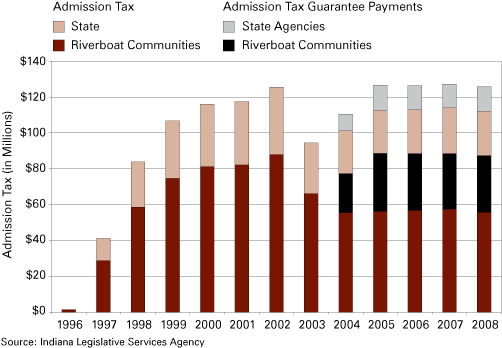Indiana Gambling Winnings Tax
Posted : admin On 4/9/2022Gambling winnings are taxable income in Indiana. Full-year Indiana residents pay tax on all of their gambling winnings, including winnings from riverboats and pari-mutuel horse races (even those winnings from out-of-state sources). But beginning with the tax year 2018 (the taxes filed in 2019), all expenses in connection with gambling, not just gambling losses, are limited to gambling winnings. What About State Taxes? In addition to federal taxes payable to the IRS, many state governments tax gambling income as well.
November 01, 2017
Have you recently won some cash at the casino or racetrack? Congratulations! While it is very exciting, keep in mind there are tax implications and you should be prepared to pay federal, state and local income taxes on the winnings.
You can anticipate that the casino or other party that provides the payout to give or send you a Form W-2G. The information reported on this federal form includes the date you won, the reportable winnings, type of wager, federal and state taxes withheld and other details about the transaction.
You will file a W-2G if you won money from any of the following sources (please note, the list is not exhaustive):

- Horse/dog track or off track betting
- Jai-alai
- State-conducted lottery
- Keno • Bingo
- Slot machines
- Poker winnings
- Any other type of gambling winnings
Keep in mind, even if you win money at a charity event that is hosted by a church or other type of non-profit organization, those winnings are taxable. If you paid money to participate in the event, such as purchased cards for a game of bingo at your church, you cannot claim the funds you spent as a donation to a non-profit organization when you file your income taxes.
If you find yourself on the losing end of a game of chance, you may wonder if you can report a gambling loss on your tax return. Generally, it is not allowable, but there are exceptions. It is advisable that you consult with a tax professional if you find yourself in such a situation or have questions.
For rules, laws and other information pertaining to gaming in Indiana, visit the Indiana Gaming Commission website at http://www.in.gov/igc/.
[toc]A bill that would legalize and regulate sports betting in Indiana includes a fee on all money wagered in the state that would be paid to sports leagues to help them deal with integrity matters, according to a version of the bill acquired by Legal Sports Report.

Indiana’s legislature has been ramping up an effort to legalize sports gambling in the state in recent weeks. Like most states considering sports betting bills, Indiana is anticipating a verdict in the New Jersey sports betting case in the US Supreme Court. A victory for New Jersey could allow for legalization of sports gambling in other states.
Integrity fee for sports betting
Here’s the language that appears in the House bill:
A sports wagering operator shall remit to a sports governing body that has provided notice to the commission under section 2 of this chapter an integrity fee of one percent (1%) of the amount wagered on the sports governing body’s sporting events. The sports wagering operator shall remit integrity fees to the sports governing body at least once per calendar quarter.
This is the first time such an “integrity fee” will have appeared in sports wagering legislation in the US.
Indiana Gambling Winnings Tax
Per the bill, a “sports governing body” refers to “the organization that prescribes final rules and enforces codes of conduct with respect to a sporting event and the participants in the sporting event.” This would seemingly pertain to pro sports leagues such as the NBA, NFL, Major League Baseball and the NHL.
ESPN’s David Purdum is reporting that the NBA and MLB are behind the effort to include the integrity fee:
Major League Baseball, NBA working on Indiana sports betting bill that would give the leagues a cut through an 'integrity fee.' Bill introduced to day in Indiana House of Reps. Story to come.
— David Payne Purdum (@DavidPurdum) January 8, 2018
More from him here.
The bill apparently has changed since LSR talked with the House sponsor of the bill, Rep. Alan Morrison, last week. The Senate version of the bill — S 405 — is different from the House version, and does not include the so-called “integrity fee.”
The bill would allow for sports wagering through licensed gaming entities in the state. It also allows for online and mobile wagering, like the Senate version.
Wagering on collegiate sporting events also appears to still be allowed in the House version. The NCAA’s presence in the state potentially complicates that matter.
Handle vs. revenue for Indiana sports betting
The one percent figure would be on handle, or the total amount wagered by sports bettors in the state — not gross revenue.
By way of comparison, Nevada sports betting handle will clock in at just under $5 billion for 2017. That would mean roughly $50 million would go to leagues if the arrangement were hypothetically applied in Nevada. Revenue will eclipse $200 million in Nevada this year.
The bill also imposes a tax of 9.25 percent on sports betting revenue (not handle) in the state. Sports betting operators appear to be able to deduct the “integrity fee” from their gross revenue for figuring the amount of tax they owe in the state.


There is also currently an excise tax of .25 percent on sports betting handle at the federal level.
Initial reaction
The American Gaming Association, which is spearheading efforts to legalize sports wagering on behalf of the gaming industry, issued this statement Tuesday morning:
“While we applaud Representative Morrison’s efforts to bring legal, transparent sports betting to Indiana, handing sports leagues 20 percent of what’s left over after winnings are paid out, undercuts its economic viability. Doing so will ensure the illegal market continues to thrive in the state, and gut the tax revenues available to fund essential public services. We believe Indiana taxpayers deserve better.
Missouri Gambling Winnings Tax Reporting

“We encourage Indiana to reject this short-sighted, misinformed idea, which simply replaces a failed federal prohibition with bad state policy. Our goal is to eliminate the illegal market, protect consumers and strengthen the integrity of the game. We invite all stakeholders to join us in working together in a thoughtful and transparent fashion.”
Leagues can ‘limit wagering’
The bill also provides a mechanism for the defined “sports governing bodies” to limit wagering on some events:
Subject to subsection (b), a sports governing body may at its election notify the commission that it desires to restrict or limit wagering on a sporting event conducted by the governing body to ensure the integrity of its contests, by providing notice in the form and manner required by the commission.The restrictions or limits may include restrictions on the sources of data and associated video upon which an operator may rely in offering and paying wagers and the bet types that may be offered.
The description of contests on which wagering can be limited appears only to include minor-league and lower level college contests. That would be the equivalent of leagues having a way to take certain games “off the board” at sportsbooks in the state.